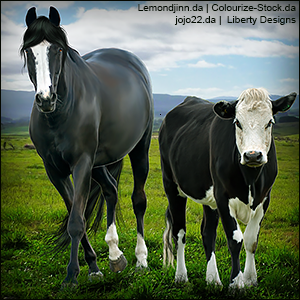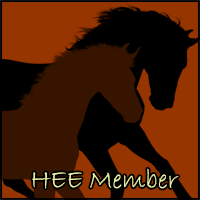| |

|
Empire Eventers said:
Anyone else have any more advice or tips? I might post a list later of the breeds we might get, but I want to try to get as much advice and as many tips as I can before we definitely decide on breeds.
Sounds like a good idea Emma ^.^ |
|
|
| |

|
Any more breeds anyone would like to suggest? IÂ’ll be making a blog soon to update what all weÂ’ve decided. If you have any suggestions after I make the blog post, feel free to comment here. |
|
|
| |
 |
Me and my husband own and operate a sheep farm, and we also grow our own crops to provide feed for the sheep when circumstances allow. Both of us grew up on similar farms and were involved in their running from a young age. That has equipped us to deal with our own farm better than any college qualification ever could, there are so so many little things that you just do not learn unless you can experience them.
I am not sure if you have any prior knowledge of farming, but I didn't find it mentioned in your posts somewhere.
If you do not have this benefit, I would seriously recommend working for other farmers first to gain some knowledge and experience in the fields you are interested in. Also, having an experienced mentor to turn to for advice will be crucial. Taking on responsibility for the welfare of a large group of animals naturally requires that you have the knowledge to care for them properly.
I would also recommend starting out small with just one or two branches - say a crop and beef cattle - and developing and learning those first. Speaking to people in the area you want to work in about what methods/breeds/etc works best for them can help a lot. The local community can be young farmers with lots of zeal but little experience's most valuable resource. Your crops/stock needs to be suitable for the area's climate and natural grazing, and there needs to be a market for your products. It's not necessarily about the prettiest/cutest/sweetest cow or chicken, but ultimately about the one that will earn you money to keep your farm running.
Once your first projects are running successfully, you can add more if you still have enough time and resources. Farming is very labor-intensive and you might need to hire extra help if you want to keep expanding. Good planning so that harvesting, calving, marketing etc do not overlap also helps a lot to stretch yourself to the max.
From personal experience I know branching into different breeds of the same animal can cause some practical difficulties - especially as they usually need to be kept apart and often have different management/nutritional needs.
Possibly you've already thought a lot of these things over, but hopefully I've given you food for thought on some. It can be a challenging lifestyle but very rewarding for the right types of person. Best of luck :) |
|
|
| |

|
Idle Hour Farm said:
Me and my husband own and operate a sheep farm, and we also grow our own crops to provide feed for the sheep when circumstances allow. Both of us grew up on similar farms and were involved in their running from a young age. That has equipped us to deal with our own farm better than any college qualification ever could, there are so so many little things that you just do not learn unless you can experience them.
I am not sure if you have any prior knowledge of farming, but I didn't find it mentioned in your posts somewhere.
If you do not have this benefit, I would seriously recommend working for other farmers first to gain some knowledge and experience in the fields you are interested in. Also, having an experienced mentor to turn to for advice will be crucial. Taking on responsibility for the welfare of a large group of animals naturally requires that you have the knowledge to care for them properly.
I would also recommend starting out small with just one or two branches - say a crop and beef cattle - and developing and learning those first. Speaking to people in the area you want to work in about what methods/breeds/etc works best for them can help a lot. The local community can be young farmers with lots of zeal but little experience's most valuable resource. Your crops/stock needs to be suitable for the area's climate and natural grazing, and there needs to be a market for your products. It's not necessarily about the prettiest/cutest/sweetest cow or chicken, but ultimately about the one that will earn you money to keep your farm running.
Once your first projects are running successfully, you can add more if you still have enough time and resources. Farming is very labor-intensive and you might need to hire extra help if you want to keep expanding. Good planning so that harvesting, calving, marketing etc do not overlap also helps a lot to stretch yourself to the max.
From personal experience I know branching into different breeds of the same animal can cause some practical difficulties - especially as they usually need to be kept apart and often have different management/nutritional needs.
Possibly you've already thought a lot of these things over, but hopefully I've given you food for thought on some. It can be a challenging lifestyle but very rewarding for the right types of person. Best of luck :)
Thank you for all the advice! Cody (my boyfriend) and I both come from families that have been in the agricultural/farming/ranching business at some point off and on throughout the last few generations, especially my family. He knows more about the crop-growing side of things, while IÂ’m more educated in the animal side of things. Thanks for the insight, though; I really appreciate it. |
|
|
| |

|
Alright, yÂ’all! I wrote a couple blogs earlier regarding this. If you have any advice feel free to continue to comment/post here, but make sure to read the two blogs I wrote so you know what Cody and I have planned out so far. Thanks for the advice to this point, and keep it all coming! |
|
|
| |

|
Still taking any advice, tips or suggestions that can be offered. Feel free to comment here or on one of my blog posts if you want to offer anything like that. |
|
|


